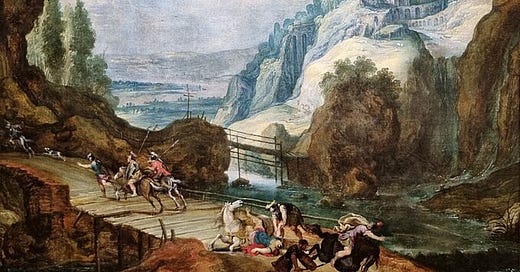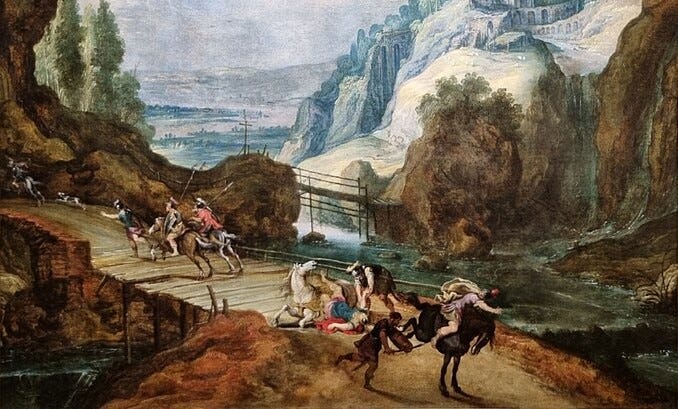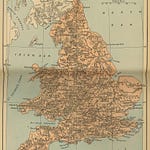“Remember me, Lord, when you come into your kingdom,” said the penitent thief on the cross beside Jesus. It is one of the main motifs in the Old Testament, that God remembers: that’s the meaning of the name Zachariah, after all. God remembered the children of Israel in their bondage in Egypt. He remembered his people in their exile in Babylon. It’s not at all as if he had not been paying attention, and then something suddenly occurred to him. There is no such portrayal of God in the Old Testament. But somehow we must speak of God, using human language, and the word remember suggests not just recalling a fact, or not even that at all, but turning toward someone you forgive, someone you remember by bringing him back into favor. That surely was on the mind of Zachariah himself, I mean the father of John the Baptist, when his tongue was loosed, and after having affirmed that his newborn child’s name would be John, that is, Johanan, The Lord is gracious, he broke into a poem he must long have been contemplating in his mind, which contains these words, “He has remembered His holy covenant.”
We say of God that he “remembers,” but for God, as Saint Augustine was careful to stipulate and to explain, there is no remembering that is not seeing and foreseeing, since all things stand in the eyes of God in one eternally present moment. Time is just one of those creatures that God has created, and it does not apply to him, just as, if I may be permitted the analogy, an author writes a novel in which time elapses, but the time of the novel has no bearing on him. He sees all events simultaneously. Yet the analogy fails when we consider that we, who dwell within this story of time, are free, and we can appeal to our Author, who himself in the person of Christ has come to dwell with us in the flesh, on earth. In any case, most of the time we beg God to remember us, but in our Poem of the Week, John Donne, who in his younger years was something of a rake, but who became one of the English church’s most brilliant preachers and authors, begs God to forget.
That word too may be taken in a couple of ways. Obviously, Donne is not begging God to become not-God, less than all-knowing. In an absolute sense, the forgetting he’s asking for makes no sense. But in the realm of grace, it does more than make sense. It is miraculous. Somehow, in those whom God saves, their very sins redound to his glory and to their joy, not because they have sinned, but because God will have brought good out of evil, “forgetting” the sin in not holding it against us, and even in making it the occasion of transforming us: as Saint Paul will always be that man who once was on fire to persecute those who followed “the Way,” but when he was on his way to Damascus, the Lord struck him blind, as a mercy, and flooded his soul with the light of truth.
In any case, in this poem which begs for remembering by forgetting, Donne imagines the blood flowing from the side of Christ, mingled with his own tears, as forming a River Lethe, the classical river of forgetfulness in ancient Greek mythology. The thing is, though, that both the blood and the tears are signs of remembrance: God, remembering us in our waywardness and our paths that lead to death, and we ourselves, remembering our sins and weeping for them. When those streams merge, says the poet, or perhaps we are to think of them as ingredients in a blessed drink, not poisons but restoratives, then we may drown our sins in them, and, as the poet Milton would say, we may “in a moment lose / In sweet forgetfulness all pain and woe.”
If poisonous minerals, and if that tree Whose fruit threw death on else immortal us, If lecherous goats, if serpents envious Cannot be damned, alas, why should I be? Why should intent or reason, born in mee, Make sins else equal, in me more heinous? And mercy being easy and glorious To God, in his stern wrath why threatens he? But who am I, that dare dispute with thee O God? Oh! of thine only worthy blood, And my tears, make a heavenly Lethean flood, And drown in it my sins' black memory: That thou remember them, some claim as debt; I think it mercy if thou wilt forget.
Listen to this episode with a 7-day free trial
Subscribe to Word & Song by Anthony Esolen to listen to this post and get 7 days of free access to the full post archives.













